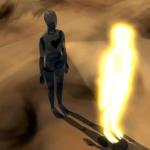One year ago I posted the essay below on the fifteenth anniversary of 9/11. Never forget.
Everyone beyond a certain age can remember clearly what they were doing fifteen years ago tomorrow when they heard the news. I was in my college’s main cafeteria getting coffee and noticed something weird happening on the Today Show broadcast on a television hanging from the ceiling in the corner. 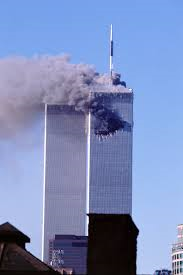 At that point all they knew was that one of the Twin Towers was on fire, apparently because an airplane had crashed into it. I had scheduled office hours that morning, so I listened to live radio reports on NPR of the second tower being hit and the collapse of both towers. There was a surreal air to the broadcast—I wanted to believe that it wasn’t true, some sort of elaborate hoax along the lines of Orson Welles’ “War of the Worlds” broadcast many decades earlier. But it was true.
At that point all they knew was that one of the Twin Towers was on fire, apparently because an airplane had crashed into it. I had scheduled office hours that morning, so I listened to live radio reports on NPR of the second tower being hit and the collapse of both towers. There was a surreal air to the broadcast—I wanted to believe that it wasn’t true, some sort of elaborate hoax along the lines of Orson Welles’ “War of the Worlds” broadcast many decades earlier. But it was true.
Classes were encouraged to meet and decide individually how best to deal with the day’s events. Several students in my first class of the day at 12:30 had family and friends who lived and/or worked in Manhattan—it was clear that the best thing for these students to do was to continue their frantic attempts to contact their loved ones. About half the class stayed and shared their thoughts—what they said and the nature of our conversation is difficult to recall. I know that many students (as well as many of my colleagues) were understandably angry and wanted retribution;  as we gathered our things to leave about half way through the class period I said “the one thing I’m feeling is that my best response to what has happened is to become a better person. A better teacher, husband, father, friend. That’s all I’ve got right now.”
as we gathered our things to leave about half way through the class period I said “the one thing I’m feeling is that my best response to what has happened is to become a better person. A better teacher, husband, father, friend. That’s all I’ve got right now.”
There will be any number of retrospective reports throughout the day and evening today. Neither Jeanne nor I lost any immediate family or close friends in that day’s terrible events, although in a few cases it was only “luck” that spared someone we know well. A decade and a half removed, when I think about 9/11 and its aftermath as I have been over the past few days, I think of patriotism, wars that seem never to end, and the realization that with the swift passage of time soon I will be teaching students who, first, will not remember 9/11 and then, two or three years later, will not have been born when 9/11 occurred. But most of all, the lasting effect in this country of the terrorist attacks on that day has been a persistent atmosphere of fear and suspicion—as well as of the hatred that fear and suspicion produce.
Just about a year ago the theme of the weekly “TED Radio Hour” on NPR was “Transformation—stories and ideas about becoming a completely different person.” The first story up that day was titled “How Did the Son of a Terrorist Choose Peace?”
How did the Son of a Terrorist Choose Peace?
The story teller, Zak Ebrahim, is a peace activist and the author of The Terrorist’s Son: A Story of Choice. Ebrahim’s father, El-Sayyid Nosair, for a number of years plotted with other radicals to attack a number of New York City landmarks, including tunnels, synagogues and the United Nations headquarters. May of these planned attacks were thwarted by an FBI informant, but one of the attacks—the 1993 bombing of the World Trade Center–was not. Nosair and his fellow terrorists were convicted of placing a van filled with 1,500 pounds of explosives into the sublevel parking lot of the North Tower; the subsequent explosion killed six people and injured over a thousand others. Ebrahim was seven years old at the time of his father’s conviction and incarceration—Nosair was sentenced to life imprisonment plus fifteen years.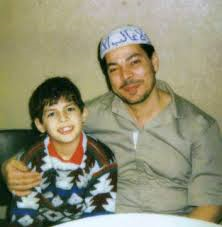
Ebrahim’s father had become radicalized in the early years of his son’s life; in his TED talk Ebrahim describes how shortly before his father was arrested he took Ebrahim, along with several of the men who turned out to be co-conspirators, to a shooting range for Ebrahim’s first lessons in using a rifle. Even after Nosair’s arrest, the impact of his worldview on his young son continued to be strong.
Growing up in a bigoted household, I wasn’t prepared for the real world. I had been raised to judge people based on arbitrary measurements, like a person’s race or religion. He would just talk about Jews being evil. And I would hear similar things from the men that were with him. You know, gay people being evil and them wanting to turn you gay so that you would go to hell too. And just gay people being all-around terrible people and a bad influence. And he used to say things like, a bad Muslim is better than a good non-Muslim. That’s pretty much what indoctrination is. You have authority figures around you telling you that the world is one way and you don’t get to see another perspective.
This radical indoctrination began to crumble when Ebrahim, as a teenager, began through school to be exposed to some of the people he had been taught to hate.  One of his fellow group members at the National Youth Conference in Philadelphia leading up to the 2000 Presidential election was Jewish. Ebrahim did not learn that his new friend was Jewish until several days after their friendship had started developing; he says that “I felt a sense of pride in having been able to overcome a barrier that, for most of my life, I had been led to believe was insurmountable.” That summer he found a job at a Busch Gardens amusement park and for the first time had the opportunity to meet some gay people performing in one of the park’s shows. “I soon found that many were the kindest, least judgmental people I had ever met.”
One of his fellow group members at the National Youth Conference in Philadelphia leading up to the 2000 Presidential election was Jewish. Ebrahim did not learn that his new friend was Jewish until several days after their friendship had started developing; he says that “I felt a sense of pride in having been able to overcome a barrier that, for most of my life, I had been led to believe was insurmountable.” That summer he found a job at a Busch Gardens amusement park and for the first time had the opportunity to meet some gay people performing in one of the park’s shows. “I soon found that many were the kindest, least judgmental people I had ever met.”
One day I had a conversation with my mother about how my worldview was starting to change. And she said something to me that I will hold dear to my heart for as long as I live. She looked at me with the weary eyes of someone who’d experienced enough dogmatism to last a lifetime, and said 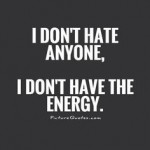 “I’m tired of hating people.” In that instant, I realized how much negative energy it takes to hold that hatred inside of you.
“I’m tired of hating people.” In that instant, I realized how much negative energy it takes to hold that hatred inside of you.
On one level it’s easy to hate because a world made of “Us” vs. “Them” is simple to define and make judgments from within. On a deeper level, though, Ebrahim is right—the negative energy of fear and hate is psychologically exhausting, an exhaustion that is symptomatic of our culture. It’s almost as if it isn’t natural for humans to hate.
A few moments of attention to the level of discourse in the current Presidential campaign are sufficient to hear the tones of fear and anger that pervade our national conversation about almost everything. It is a season of intolerant and fear-mongering language. That such attitudes exist is nothing new; what is new is that we have reached the point where hatred and intolerance have found a new foothold in the public square and conversation. And even for those who seek a moderate position that avoids anger and fear, the current atmosphere is infectious. 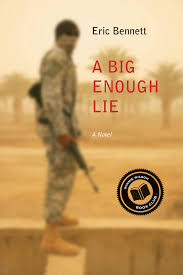 A character in Eric Bennett’s new novel A Big Enough Lie explains the dynamic well:
A character in Eric Bennett’s new novel A Big Enough Lie explains the dynamic well:
There are people in the world whose opinions differ from yours so much that the difference implies violence, urges it, supplies a will for it. And if you stand on the side of moderation, this implication, this will to violence, upsets you even more than the mere difference of opinion itself. Because you are complicit in it—you become complicit in extremism by loathing extremism. You are reduced by your enemy to what you despise in your enemy. The world excuses only saints and lunatics from its economy of hatred, is what you realize. Pick a side.
On this fifteenth anniversary of one of the darkest days in American history, my hope is that we as a nation, as a culture will decide, as Zak Ibrahim’s mother did, that we are tired of hating people. 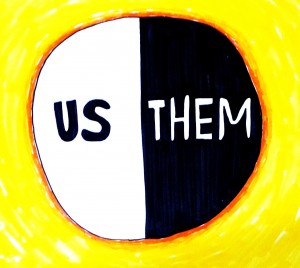 Tired of dividing our tiny little universes up into “Us” and “Them” as we vilify those who do not look like, act like, or believe the same as those in our self-defined groups of specialness do, often in the name of rigidly dogmatic beliefs that cannot accommodate the complex and shades-of-grey world in which we live. As Zak Ebrahim discovered, the best cure for fear and hatred is simple experience. But such experience can only happen if each of us has the courage to step outside our ossified comfort zones and dare to meet the most frightening thing in the universe—someone who is not the same as me.
Tired of dividing our tiny little universes up into “Us” and “Them” as we vilify those who do not look like, act like, or believe the same as those in our self-defined groups of specialness do, often in the name of rigidly dogmatic beliefs that cannot accommodate the complex and shades-of-grey world in which we live. As Zak Ebrahim discovered, the best cure for fear and hatred is simple experience. But such experience can only happen if each of us has the courage to step outside our ossified comfort zones and dare to meet the most frightening thing in the universe—someone who is not the same as me.



